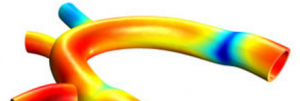The tool is just about one millimeter wide; the tools used to process it are also just as small. Yet even under these conditions there are ways and means to meet the high requirements on quality in the manufacturing of medical devices.
A microscope mounted on a bench vice— there could not be a better symbol for how manufacturing is carried out at Günter Stoffel Medizintechnik GmbH located in the southern German city of Wurmlingen: here you will find an intriguing mixture of modern CNC Machining and old craftsmanship. And the requirements are extreme. For instance, the 15 employees manufacture cups for biopsy forceps; the smallest of which is just 0.8 mm wide. The width of the blade at the edge of the cup is only 0.01 mm, and the blades have to match up precisely when they meet. Achieving this level of precision requires many steps, such as deburring and polishing. Adjustments for perfect function and the riveting of the joint of the forceps are done by hand, which places the highest requirements on the employees.
The parts coming from the CNC machines have to be as accurate as possible for manual work to be kept to a minimum. “In assembly, you notice every hundredth of a millimeter,” explains managing director Dieter Stoffel.
At Stoffel, chip removal takes place in a non-air conditioned basement. The machines in the basement have a calculated temperature compensation system that can compute correction values based on travel range, spindle speed, and period of use. The internal compensation system reaches its limits when tools have to be switched frequently, however.
This problem was brought up when Erhard Strobel, sales associate at Blum-Novotest GmbH in Ravensburg, visited the company. He suggested the Z-Pico tool setting probe as a solution. This probe can measure very precisely the length of the tool and compensate the axes accordingly. “Our very thin tools are a challenge, however,” adds the responsible production manager at Stoffel. “We are working, among others, with 0.5-millimeter centering holes where the tip will break off under the slightest incorrect stress, and the drill becomes two to three micrometers shorter.” This has a reciprocal effect on precision. The Z-Pico tool setting probe works using less measuring force, making it “perfectly suited for the small tools we use,” praises the production manager.
A precise linear guide works inside the probe. According to Strobel at Blum-Novotest, this feature makes the probe free of transverse forces, allowing for a measurement of very small, sensitive, or long tools with a diameter of 0.05 mm or more. In addition, the switch signal is generated by an optoelectronic effect created by the shadow of a miniature light barrier inside the device. The two temperature compensation measurements are not set in the NC program until after the roughing processes are complete since these processes do not require high precision. The correction factor obtained from the measurement is written in all tool tables so that the next roughing process will benefit from the measurement.
The finishing tools are measured directly before processing, however, allowing for the thermal behavior of the tool holder to also be taken into account, for example. The measuring procedure itself takes only a few seconds, also due to the fact that the tools are positioned for measurement with rapid feed rate right in front of the longest possible tool dimension.
One of the processing centers that manufactures mainly round handle instruments uses Blum’s Laser Control Micro Compact NT laser measuring system instead of Z-Pico. In round handle processing, precision of the Y-axis is very importance: the laser system corrects the offset of the tool as well as the offset of the axis and table.
The extra precision helps Dieter Stoffel in marketing also. “It has again improved to some degree the look and feel of quality that surgeons get from our instruments.”
Winfried Weiland Blum-Novotest, Ravensburg
Why Precision is so Important
Günter Stoffel Medizintechnik GmbH based in Wurmlingen, Germany, specializes in the development and manufacturing of high-quality surgical and endoscopic instruments. Günter Stoffel started manufacturing round handle instruments, such as scissors, forceps, and needle holders on the side in 1971. Many surgeons prefer this shape where the two handles together form an almost circular profile as it allows them to rotate the handle very delicately in their hand.
But there were already round handle instruments on the market. These products had a straight knurl at the round edge of the handle. For Stoffel it was clear that, as a newcomer, he needed to offer a product that looked different so it could stand out from the competitor product. So he introduced a diamond knurl to his instruments, which improved the grip and ultimately made the breakthrough. In 1978 business had become so successful that Stoffel started running his company as his main occupation. In 1981 biopsy and foreign body forceps having diameters of 0.8 mm to 3.5 mm formed the second main branch of the company. A surgeon can use these instruments to enter through natural orifices or small incisions in the body to collect tissue samples or remove foreign bodies. The third main branch of the company includes clamps; these small clamps come in different sizes and used to retain veins.
Today the family-run business employs roughly 450 people at a total of seven locations in Europe as well as the USA, China, Japan, Taiwan, Singapore, South Korea, India, Brazil, and Thailand.
Unsere Webinar-Empfehlung
Erfahren Sie, was sich in der Medizintechnik-Branche derzeit im Bereich 3D-Druck, Digitalisierung & Automatisierung sowie beim Thema Nachhaltigkeit tut.
Teilen:








